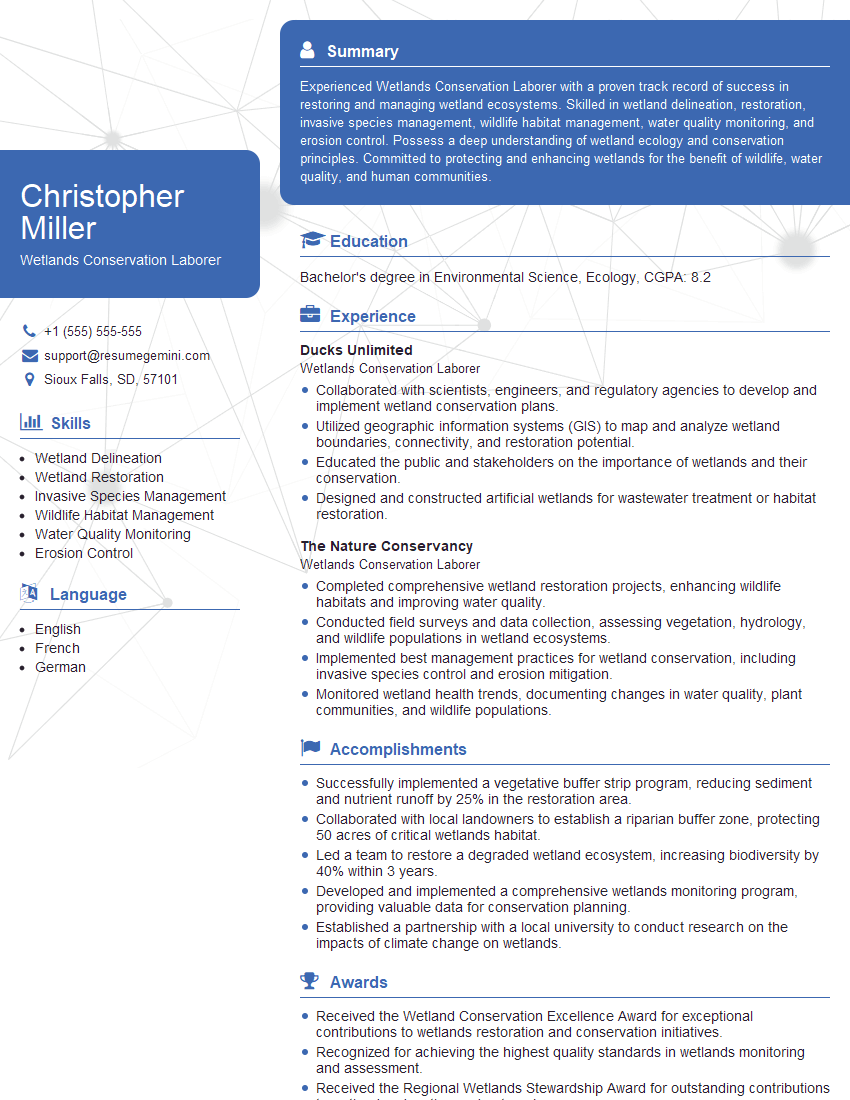Are you a seasoned Wetlands Conservation Laborer seeking a new career path? Discover our professionally built Wetlands Conservation Laborer Resume Template. This time-saving tool provides a solid foundation for your job search. Simply click “Edit Resume” to customize it with your unique experiences and achievements. Customize fonts and colors to match your personal style and increase your chances of landing your dream job. Explore more Resume Templates for additional options.

Christopher Miller
Wetlands Conservation Laborer
Summary
Experienced Wetlands Conservation Laborer with a proven track record of success in restoring and managing wetland ecosystems. Skilled in wetland delineation, restoration, invasive species management, wildlife habitat management, water quality monitoring, and erosion control. Possess a deep understanding of wetland ecology and conservation principles. Committed to protecting and enhancing wetlands for the benefit of wildlife, water quality, and human communities.
Education
Bachelor’s degree in Environmental Science, Ecology
August 2016
Skills
- Wetland Delineation
- Wetland Restoration
- Invasive Species Management
- Wildlife Habitat Management
- Water Quality Monitoring
- Erosion Control
Work Experience
Wetlands Conservation Laborer
- Collaborated with scientists, engineers, and regulatory agencies to develop and implement wetland conservation plans.
- Utilized geographic information systems (GIS) to map and analyze wetland boundaries, connectivity, and restoration potential.
- Educated the public and stakeholders on the importance of wetlands and their conservation.
- Designed and constructed artificial wetlands for wastewater treatment or habitat restoration.
Wetlands Conservation Laborer
- Completed comprehensive wetland restoration projects, enhancing wildlife habitats and improving water quality.
- Conducted field surveys and data collection, assessing vegetation, hydrology, and wildlife populations in wetland ecosystems.
- Implemented best management practices for wetland conservation, including invasive species control and erosion mitigation.
- Monitored wetland health trends, documenting changes in water quality, plant communities, and wildlife populations.
Accomplishments
- Successfully implemented a vegetative buffer strip program, reducing sediment and nutrient runoff by 25% in the restoration area.
- Collaborated with local landowners to establish a riparian buffer zone, protecting 50 acres of critical wetlands habitat.
- Led a team to restore a degraded wetland ecosystem, increasing biodiversity by 40% within 3 years.
- Developed and implemented a comprehensive wetlands monitoring program, providing valuable data for conservation planning.
- Established a partnership with a local university to conduct research on the impacts of climate change on wetlands.
Awards
- Received the Wetland Conservation Excellence Award for exceptional contributions to wetlands restoration and conservation initiatives.
- Recognized for achieving the highest quality standards in wetlands monitoring and assessment.
- Received the Regional Wetlands Stewardship Award for outstanding contributions to wetlands education and outreach.
- Recognized for developing innovative techniques for wetland restoration, resulting in improved water quality.
Certificates
- Wetland Science Professional (WSP)
- Qualified Wetland Delineator (QWD)
- Environmental Site Assessor (ESA)
- Erosion and Sediment Control Inspector (ESCI)
Career Expert Tips:
- Select the ideal resume template to showcase your professional experience effectively.
- Master the art of resume writing to highlight your unique qualifications and achievements.
- Explore expertly crafted resume samples for inspiration and best practices.
- Build your best resume for free this new year with ResumeGemini. Enjoy exclusive discounts on ATS optimized resume templates.
How To Write Resume For Wetlands Conservation Laborer
- Highlight your experience in wetland delineation and restoration.
- Demonstrate your knowledge of wetland ecology and conservation principles.
- Quantify your accomplishments whenever possible, using specific metrics.
- Showcase your ability to work independently and as part of a team.
Essential Experience Highlights for a Strong Wetlands Conservation Laborer Resume
- Conduct wetland delineations and assess wetland health trends.
- Implement best management practices for wetland conservation, including invasive species control and erosion mitigation.
- Monitor wetland health trends, documenting changes in water quality, plant communities, and wildlife populations.
- Collaborate with scientists, engineers, and regulatory agencies to develop and implement wetland conservation plans.
- Educate the public and stakeholders on the importance of wetlands and their conservation.
- Utilize geographic information systems (GIS) to map and analyze wetland boundaries, connectivity, and restoration potential.
Frequently Asked Questions (FAQ’s) For Wetlands Conservation Laborer
What is the role of a Wetlands Conservation Laborer?
Wetlands Conservation Laborers play a vital role in protecting and restoring wetland ecosystems. They conduct field surveys, implement conservation practices, and educate the public about the importance of wetlands.
What are the qualifications for a Wetlands Conservation Laborer?
Typically, a bachelor’s degree in environmental science, ecology, or a related field is required. Experience in wetland delineation, restoration, and management is also highly valued.
What are the key skills and responsibilities of a Wetlands Conservation Laborer?
Key skills include wetland delineation, restoration, invasive species management, wildlife habitat management, water quality monitoring, and erosion control. Responsibilities typically involve implementing conservation practices, monitoring wetland health, and educating the public.
What are the career prospects for a Wetlands Conservation Laborer?
With increasing concerns about environmental protection, the demand for Wetlands Conservation Laborers is expected to grow. Career opportunities exist in government agencies, non-profit organizations, and private consulting firms.
What are the challenges faced by Wetlands Conservation Laborers?
Challenges include working in often difficult and remote conditions, dealing with invasive species and pollution, and balancing the needs of wildlife with human activities.
What are the rewards of being a Wetlands Conservation Laborer?
Wetlands Conservation Laborers make a real difference in protecting and restoring vital ecosystems. They enjoy working outdoors, learning about the natural world, and contributing to the preservation of our planet.